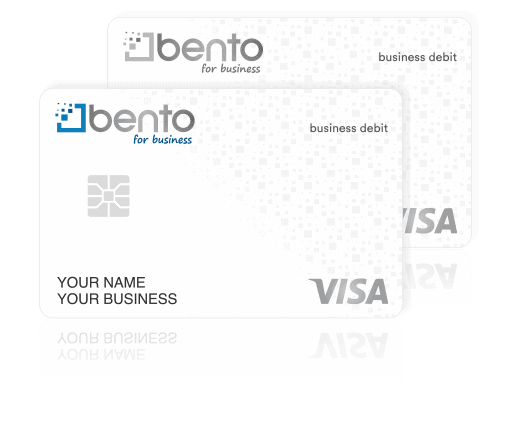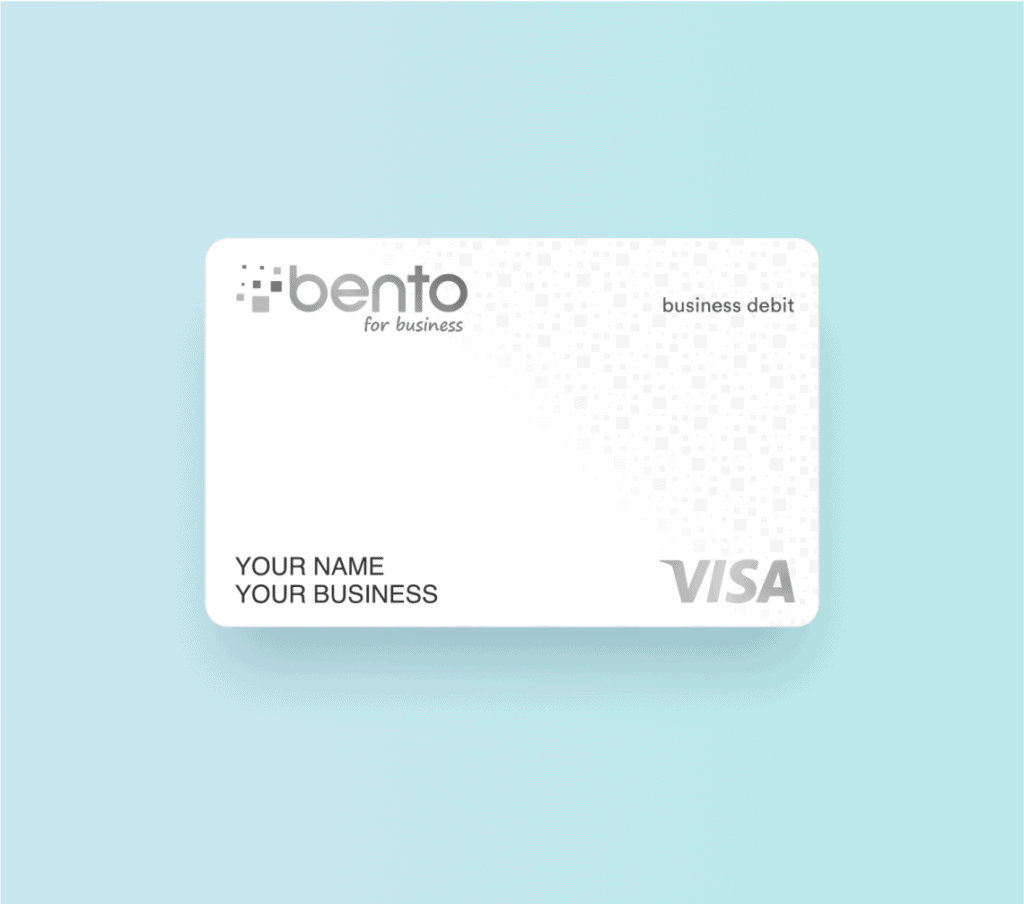Overview
- What is a Corporate Credit Card?
- Advantages of Corporate Cards
- Disadvantages of Corporate Cards
- What is a Business Credit Card?
- Advantages of Business Credit Card
- Disadvantages of Business Credit Cards
- Differences Between Business Cards and Corporate Cards
- Which Card is the Best for Your Business?
- Fortify Your Business's Financial Future with Bento
A business credit card is designed for small businesses, start-ups, and entrepreneurs who need access to short-term capital or rewards when making business purchases. These cards bear the name of an individual and require no personal guarantee.
Corporate credit cards are more suitable for larger organizations to control company spending on travel, supplies, and other work-related expenses.
Both cards have distinct advantages and disadvantages, depending on your particular needs. Let’s explore these differences to help you choose the more suitable card for your business or company.
What is a Corporate Credit Card ?

Corporate visa cards are in many ways similar to traditional business cards but with additional benefits such as:
- Increased spending limits
- Improved data analytics capabilities
- Access to other services like travel booking tools or expense-tracking software
These business corporate cards tend to have higher annual fees than other business cards, but they offer more competitive interest rates depending on the issuer’s terms and conditions.
Businesses that need access to additional funds for daily operations or want to take advantage of promotional offers or discounts when making large expenditures can benefit from corporate credit cards.
Advantages of Corporate Cards
As the name suggests, corporate credit cards are only accessible to C-corporations, S-Corporations, and particular LLCs with a credible and sound credit history.
Such businesses should have annual revenue of $4 million and above, 15 or more authorized users, and projected yearly credit card charges of $250,000 and above.
Approval for corporate credit cards depends on the business’s financial situation since the responsibility of paying the bill falls on the company, not the employees or owner. The advantages of having a visa corporate card rather than a business credit card include the following:
Higher Spend Limits
One of the primary advantages of using a corporate credit card is higher spending limits. It allows you to make larger purchases without worrying about exceeding your budget or running into cash flow issues.
With higher credit limits, you can also take advantage of promotional offers and discounts on items such as office supplies or travel expenses to save money while delivering quality service and products for customers.
Cashflow Management
Corporate cards provide an efficient way to manage business cash flows. By issuing employee cards, you can easily track spending habits across departments, monitor overall expenditures, and ensure the proper allocation of resources according to company policies.
For instance, you can issue your team with Spend Limit Bento cards for day-to-day business expenses.
Every team member can submit receipts by simply taking a picture, thanks to AI-Powered receipt capture. This visibility helps you understand how and where your employees spend business funds, so you can make better business decisions while avoiding unnecessary losses due to mismanagement.
Additional Services and Tools
Most corporate cards come with access to additional services such as expense tracking software or travel booking tools which can help streamline processes like bookkeeping and planning trips.
For instance, Bento’s corporate cards eliminate time-consuming processes in these ways:
- Your team won’t need approval workflows
- You can track transactions in real-time
- You’ll spend less time filling and monitoring expense reports
- Each card will have unique, customizable controls
Bento saves time and reduces paperwork associated with manual data entry or processing tasks.
These cards come with pre-approved spend controls, and the automation eliminates potential errors from human input. It’s the easiest way to maintain accurate records for tax purposes or other financial reporting requirements.
Reward Programs
Corporate cards offer reward programs where you can earn points towards merchandise or services depending on how much you spend each month.
These programs incentivize employees to use the card responsibly since rewards earned through these programs usually outweigh any interest costs incurred from carrying a balance on the account.
Cost Benefits
Corporate credit cards often come with lower interest rates than business cards and can be more cost effective for large companies that make frequent purchases.
Corp cards also often provide cash-back rewards as an added incentive for using the card.
Security
Most corporate charge cards come with advanced security measures such as chip technology and fraud protection services, which help to protect against unauthorized charges and identity theft. This is especially important in today’s digital world, where data breaches are becoming increasingly common.
Bento prevents such breaches by hosting all personal and card information on encrypted Google Pay and Apple Pay wallet systems. This information remains secure, so you don’t have to worry about misplacing or losing a card.
Furthermore, you can implement two-factor authentication in Bento’s mobile wallet apps for all transactions to get an extra security layer.
Accountability
A corporate card allows you to track all purchases, so there is greater accountability when it comes to spending. This helps ensure that your team uses funds responsibly without misuse or abuse from those who have access to the card.
With Bento, you can ensure accountability by:
- Activating or deactivating a card anytime
- Allowing international use only when necessary
- Limiting expenses to workdays only
- Restricting some merchants to avoid unauthorized use.
Bento’s dashboard allows you to import and export data to analyze real-time spending data.
Disadvantages of Corporate Cards
Higher Risk of Abuse or Misuse
One of the primary disadvantages of using a corporate credit card is the potential for employee misuse or abuse.
With proper oversight, it can be easier to monitor how much your team spends and ensure that all purchases are legitimate business expenses.
Since most cards offer generous reward programs, you must take extra care to prevent any personal spending, as this could lead to financial losses in the long term.
Bento has adequate measures to prevent such occurrences. You can set, modify or change spending limits on each card, cancel the card, or restrict some merchants.
Stricter Qualification Requirements
Obtaining new corp cards can be challenging due to stricter qualification requirements. These requirements include personal and business information about applicants and proof that you’ll have sufficient funds available for monthly repayment before you get approval from most banks.
What is a Business Credit Card?
A business credit card is a line of credit offered to businesses to finance daily activities and operations.
You can use a business card to make purchases, pay bills, earn rewards, and accumulate points. These cards typically come from banks or financial institutions and offer features that may include promotional offers, flexible spending limits, and reward programs.
Business cards are subject to annual fees and interest rates based on your credit score.

Advantages of Business Credit Card
Business credit cards are credit cards that are reserved for businesses rather than for individual consumers. To get a business credit card, a business owner and the business normally both have to submit to credit checks.
Charges on the credit card add to the debt balance on the attached revolving line of credit. Unlike p-cards, balances on business credit cards may be charged high rates of interest, and the cards may also carry high annual fees. By contrast, p-card charges must be paid in full every month, or the cards may be linked to a business’s account so that the charges are paid automatically.
Promotional Offers
One of the biggest advantages of having a business credit card is that it allows you to take advantage of promotional offers.
Most cards offer rewards such as cash-back, discounts on travel or merchandise purchases, and other exclusive deals, which can help save money while increasing efficiency. You’ll also benefit from secure and centralized billing systems offered by most banks, allowing you to manage all your expenses in one place.
Reward Programs
Reward programs allow you to accumulate points for every dollar you spend, which you can redeem for goods or services.
Some cards even offer higher rewards for specific categories like gas, dining, or office supplies, making it easier for you to rack up rewards quickly while taking care of necessary expenses.
Flexible Spend Limits
Most business credit cards come with flexible limits to grow as your company expands its operations. This allows you access to additional funds when needed without going through an extensive re-qualification process each time you request an increase in spending capacity.
Disadvantages of Business Credit Cards
Higher Chances of Overspending
One disadvantage of a business credit card is the potential for overspending if not appropriately managed. It’s crucial to set clear guidelines and spending limits with your employees to avoid any unnecessary charges or impulse purchases that can quickly add up.
Lack of Control over Spending Habits
Another downside of having a business credit card is the lack of control over employees’ spending habits.
Without proper oversight and accountability, it can be challenging to monitor how much every employee spends on each transaction, leading to misuse or abuse of business funds.
For better compliance, consider giving access only to authorized personnel with proper training in the responsible use of corp cards. You should also set detailed policies outlining acceptable use and consequences for violating those policies.
Higher Costs
As a business owner, you must remember that you will incur additional costs when issuing these cards. Most issuers charge an annual fee per cardholder regardless of whether the holder makes any purchases throughout the year.
Business credit cards also come with higher interest rates than corporate credit cards, making them more expensive if you need to make frequent purchases. Additionally, most business cards do not provide cash-back rewards, so you’ll miss out on the potential savings from using the card.
Fewer Rewards
While business credit cards may offer rewards programs, they are typically less generous and have fewer options for earning points or miles.
This can limit the amount of money a company saves by taking advantage of these incentives.
Lower Spending Limits
Business cards often have lower spending limits than corporate credit cards due to the smaller size and scope of most businesses. You may need additional financing if your needs exceed what is available through your card provider’s maximum limit.
Security
Most business credit cards do not feature advanced security measures such as chip technology or fraud protection services, leaving you vulnerable to unauthorized charges and identity theft when using your card online or at physical stores.
Fraud Protection
Some business credit card providers lack adequate fraud protection protocols, which can put customer information at risk in case someone else gains access to it without permission.
It is essential to ensure you take steps toward keeping customer data safe from any possible breaches or misuse by third parties who could gain access to it.
Differences Between Business Cards and Corporate Cards
1. Cost
The cost of a corporate credit card is generally lower than that of a business credit card due to the larger scale of purchasing typically associated with corporations.
Corporate cards often come with lower interest rates and provide cash-back rewards as an added incentive for using the card.
2. Rewards
Business credit cards have fewer reward options than corporate cards, so you may miss out on potential savings from taking advantage of these incentives.
However, some business credit cards offer points or miles for future travel expenses and discounts on goods and services purchased with the card.
3. Approval Process
Corporate credit cards require approval from higher-level management, while business credit cards usually only need this authorization after purchase.
This gives you more flexibility when managing your finances without someone else involved in each transaction. However, it also leaves you open to possible misuse by employees who have access to the card if you don’t have proper controls in place.
4. Acceptance
Most locations accept corporate credit cards, while business Credit Cards may only be acceptable at certain vendors or retailers depending on the card’s network affiliation (Visa/Mastercard/American Express).
5. Spending Limits
Spending limits set by corporate providers are much higher than those imposed by business Credit Cards providers. Larger organizations require more funds than smaller businesses or start-ups throughout the year.
6. Target Audience
Business cards and corporate credit cards have different target audiences due to the varied needs of each type of customer.
Businesses usually require higher spending limits to make larger purchases, while individual consumers often prefer lower limits that are easier to manage.
Additionally, businesses can take advantage of promotional offers or discounts when making large expenditures, whereas individuals may not receive those same benefits.
Which Card is the Best for Your Business?
When deciding between corporate and business credit cards, it is crucial to consider their benefits and limitations to determine what type best fits your needs.
Corporate credit cards tend to come with lower interest rates than business cards but also require higher spending limits due to their larger scale purchasing power.
Business credit cards often provide more flexible payment options and potential reward programs but may not offer as much protection from fraud or identity theft as corporate ones.
Ultimately, understanding how each type of card works will help you select the right solution for your financial requirements while avoiding unnecessary expenses.
Before signing up for a particular card option, ensure you understand its costs and any special features or incentives it may provide to get the most out of your chosen solution.
It’s also essential to consider factors such as annual fees or hidden costs associated with each option so there won’t be surprises later on.
Once you have determined which type of card is best suited for your company’s requirements based on cost-effectiveness and convenience, ensure you take steps towards ensuring proper use by implementing adequate controls and monitoring processes within your organization.
This can help protect against unauthorized charges or misuse by employees who have access to the card if proper protocols are not in place.
Fortify Your Business’s Financial Future with Bento
Your choice between a business and a corporate card depends on your business needs.
Corporate cards come with lower interest rates and higher spending limits due to their larger-scale purchasing power. In contrast, business cards offer more flexible payment options and potential reward programs.
If you need help deciding which card is most suitable for your business needs, Bento is your ultimate solution. Bento offers multiple cards with the same functionalities as standard corporate cards but with more sustainable solutions.
For instance, you can get Spend Limit Bento cards for daily and recurring expenses that require submitting receipts. Creating and managing these cards on a unified mobile and web platform is easy. You can use fixed Value Bento cards for specific purposes like paying vendors or one-time payments.
The Bento Dashboard allows you real-time visibility and control over your business expenses. The sign-up and approval process is simple and requires no credit checks or personal guarantees. Once download the Bento app, you can access all data to stay updated on card activity on the go.






